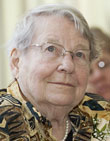Pioneering legislator Constance Cook, CU trustee and first woman vice president, dies at 89
By George Lowery

Constance Knowles Eberhardt Cook, a lawyer, legislator, pilot, Congressional candidate, Fulbright scholar and Cornell's first woman vice president, died Jan. 20 at Longview in Ithaca. She had spent the day watching the inauguration of Barack Obama and discussing her hopes for the new administration. She was 89.
Born in Shaker Heights, Ohio, Cook received her bachelor's (1941) and law degrees (1943) from Cornell. She was elected to the New York State Assembly in 1962. A Republican, she represented the 128th Assembly District, which then included the counties of Tompkins, Yates and Seneca. In 1970, she sponsored a bill to repeal state anti-abortion laws and to provide for legal, on-demand abortions during the first 24 weeks of pregnancy. The state Senate had passed its version of the bill, and, following one of the bitterest debates in the Assembly's history, abortion became legal in New York by a one-vote margin. Cook left the Assembly in 1974.
During the mid-1970s Cook represented the Rev. Betty Bone Schiess of Syracuse, who had been ordained as a priest in Philadelphia by "renegade" Episcopal bishops before the church admitted women to the priesthood. Cook helped Schiess sue her bishop on grounds of gender-based employment discrimination. The case helped force the church to revise its canon law in 1977 to allow ordination of women.
In 1976, Cook became Cornell's first woman vice president (for land grant affairs), a position she held until 1980. She drew on her many Albany connections to advocate for Cornell, which she also served as a trustee from 1969 to 1974. She ran unsuccessfully for Congress in 1984.
"Connie Cook served Cornell with distinction as vice president for land grant affairs, becoming the first woman to serve as an executive officer," said Cornell President Emeritus Frank H.T. Rhodes. "Because she was an alumna of the university and had served on both the board of trustees and on the state Assembly, she was a knowledgeable and powerful champion for Cornell's interests.
"She knew everyone. She was energetic, outgoing, generous, articulate and warm. She was a compassionate conservative long before the term entered into the political lexicon. She was an especially powerful advocate, too, for women and the needy. The university owes much to the convictions and commitment of a remarkable woman. I am proud to have known her and to have served with her."
In 1986 she returned to the practice of law with the Ithaca firm True Walsh and Miller, where one of her colleagues was her former legislative assistant Sally True, J.D. '78. "She was and remained a delightful, vivacious, curious person who dealt with people effectively and respectfully," True said. "I was grateful to have her as a first employer. She taught me a great deal professionally, and she was a very inclusive person who always recognized the contributions of those with whom she worked."
True recalled attending a meeting in Albany with Cook in the 1970s that was held at a club with separate entrances for men and women. "We were not permitted through the front door," True said. But Cook gave her speech to the Republican Assembly legislators. "We came in through the employees' entrance. It was good instruction for a young woman professional: You can get distracted or you can move ahead. Connie knew how to roll with the punches."
Cook was appointed to serve on Cornell's Advisory Committee on the Status of Women (ACSW), which made recommendations to develop and maintain a climate at Cornell that ensured equal access, opportunity and protection for women in all areas and activities. The ACSW annually confers the Constance E. Cook and Alice H. Cook Recognition Award on members of the Cornell community who have made positive contributions to women or women's issues. The late Alice Cook (no relation to Constance) was a pioneering ILR School professor.
In 1986 Constance Cook was inducted into the Cornell Athletic Hall of Fame for her undergraduate participation in fencing and field hockey. She captained the fencing team in her senior year. She was also president of the Intercollegiate Fencing Association and the Women's Athletic Association Council in 1941.
Cook's papers are held in the Cornell Library's Division of Rare and Manuscript Collections.
Her husband, Alfred P. Cook, predeceased her. She is survived by two children and three grandchildren. A public memorial service will be announced.
Media Contact
Get Cornell news delivered right to your inbox.
Subscribe